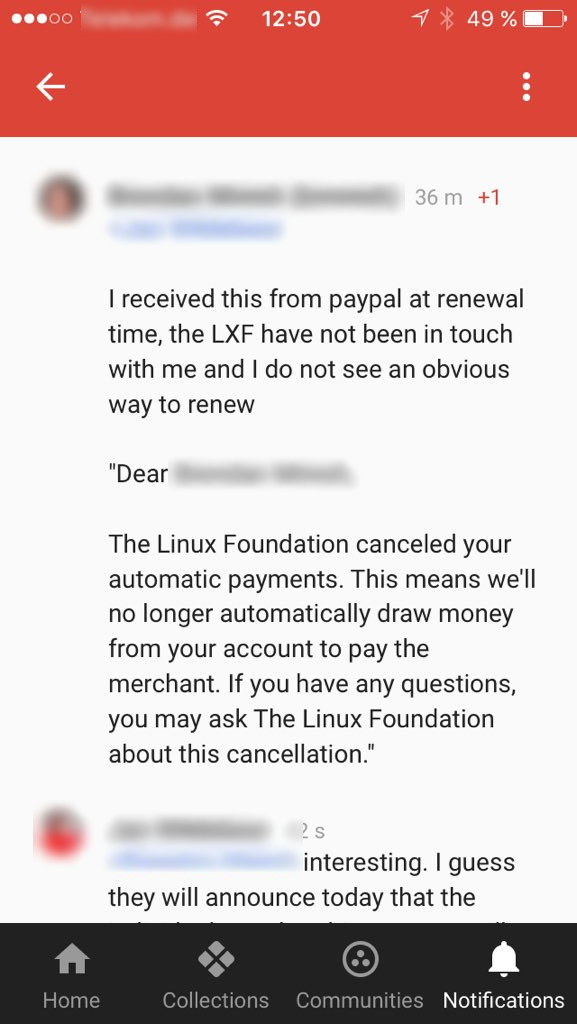

TODAY is a special day. It's Penguin Awareness Day, but putting aside the Linux and the Tux mascot, there's not much to celebrate because the Linux Foundation reveals signs of rot. The FSF is to the Linux Foundation what astronomy (science) is to astrology (big business around pseudo-science) and having already attempted to delete GNU from history* (a common phenomenon), the Linux Foundation now deletes the role that individuals played in the development of the system. We're meant or at least led to thinking that the kernel, Linux, was quietly 'taken over' by a consortium of corporations, many of which have mixed loyalties (not just to Linux).
"We're meant or at least led to thinking that the kernel, Linux, was quietly 'taken over' by a consortium of corporations, many of which have mixed loyalties (not just to Linux)."EPO coverage has prevented us from covering as much about the Linux Foundation as we used to, including payments from Microsoft, services to Microsoft, and abandonment of GPL enforcement efforts because GPL enforcers went after a Microsoft executives-run VMware.
Matthew Garrett raised an important point and asked: "Did the Linux Foundation just drop all semblance of community representation because it's afraid of GPL enforcement?"
There is already coverage stemming from the original rant [1], which has been mentioned by several news sites so far, e.g. [2,3]. We have received the above evidence which serves to reinforce these claims that the Linux Foundation keeps drifting away to wherever the big money is (usually companies that try to control or dominate Linux). The Linux Foundation does not represent Linux users (OSDL hardly ever pretended to do so) but mostly hardware companies that want to influence the development process/es. The Linux Foundation dumped support for GPL enforcement because of VMware. This is a good example of E.E.E. The latest Microsoft openwashing, for instance, reportedly helps it grab control/foothold at V8's expense in the same way that a foot inside the Linux Foundation (with Novell's helping hand) let Microsoft inject GPL-violating code into the kernel, promoting the proprietary Hyper-V at the expense of FOSS hypervisors.
"We have received the above evidence which serves to reinforce these claims that the Linux Foundation keeps drifting away to wherever the big money is (usually companies that try to control or dominate Linux)."There is no 'new' Microsoft. "Microsoft have not added support for OpenDocument Format to iOS and Mac OS X," for instance. Microsoft only wants to promote proprietary Microsoft lock-in. That's what Microsoft does inside Android, inside Linux, and even inside Debian these days. "There's at least one Microsoft staff inside Debian," iophk warned us, citing this page from Microsoft. "Jose Miguel Parrella," it says, is "a Debian Developer and member of Microsoft’s Open Source Strategy team." Remember that also the Linux Foundation is full of 'former' Microsoft staff, even at relatively high positions (like management). Debian, in light of some recent agreement with Microsoft (we didn't find time to cover it), should definitely watch out as there's E.E.E. going on. The Linux Foundation too is now at risk of becoming obsolete (loss of support from the public) because it publicly shows that it metaphorically "Says Let Them Eat Cake," to quote today's headline from Susan Linton, founder of Tux Machines. Sam Varghese says the Linux Foundation "backs corporates, not community," to quote his own headline (below). To make the Linux Foundation a strong player for copyleft (e.g. GPL enforcement) help elect the FSF- and SFLC-connected Karen Sandler. She's running for the Linux Foundation Board of Directors. ⬆
Related/contextual items from the news:
The Linux Foundation is an industry organisation dedicated to "promoting, protecting and standardising Linux and open source software"[1]. The majority of its board is chosen by the member companies - 10 by platinum members (platinum membership costs $500,000 a year), 3 by gold members (gold membership costs $100,000 a year) and 1 by silver members (silver membership costs between $5,000 and $20,000 a year, depending on company size). Up until recently individual members ($99 a year) could also elect two board members, allowing for community perspectives to be represented at the board level.
Matthew Garrett, kernel contributor and social activist, today posted of his discovery of a little change at the Linux Foundation. The foundation left regular users and individual developers behind for large corporate sponsors years ago, but today Garrett said they made it official. One little clause was removed from the by-laws, but it removes so much more from the foundation.
The Linux Foundation has given its clearest indication yet that it caters to corporates rather than the community, by making it impossible for community representatives to be elected to its board.
Comments
Needs Sunlight
2016-01-21 20:00:24
Knowing the particulars of how the bylaws were changed, and by who, is a start.
Needs Sunlight
2016-01-21 13:16:37
Yuhong Bao
2016-01-21 19:37:24
Yuhong Bao
2016-01-21 19:44:10